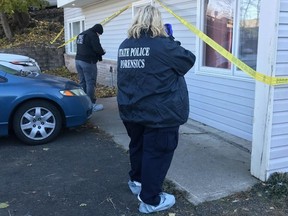HUNTER: Hopelessness reigns as cops hit wall in University of Idaho massacre

Article content
Most small-town murders are slam dunks.
Husband, wife, son, daughter, buddies in a bar arguing over sports, women, politics or the price of peaches in Pittsburgh. The whole Forensic Files cast.
Seldom do local cops have to deal with something like a quadruple homicide of mind-boggling brutality.
But that’s the position police in tiny Moscow, Idaho — population 23,000 — find themselves. They are simply not trained and equipped to handle the massacre officers discovered on the morning of Nov. 13.

On that terrible day, four University of Idaho students were discovered stabbed to death in the beds of their rental home just off campus. The coroner said the tragic quartet was murdered while they slept.
The attack claimed the lives of housemates Madison Mogen, 21; Xana Kernodle, 20; Kaylee Goncalves, 21, and Kernodle’s boyfriend, Ethan Chapin, 20. Cops have said that so far, they have no suspects and no persons of interest.
The feds have now been flown in to lend a hand in a case that seems without end. In place of a resolution, there are rumours and suspicion. One young law student came under suspicion because, as he said, he’s socially awkward.

Cops have torpedoed any connection to eerily similar slayings in Washington state, just over the border, and in Oregon.
Recommended video
Criminologists have suggested that the killer likely knew at least one of the victims and was “comfortable” around blood.
And it appears that local cops are keeping their cards close to their chests. Detectives call this hold-back evidence, sometimes as an excuse to be deliberately opaque, other times for legitimate investigative purposes.
That leaves a lot of questions for the victims’ families, students and the community at large.

The father of slain student Kaylee Goncalves told Fox News that while he supports the efforts of local cops, he is concerned about the lack of transparency in the investigation.
“You can’t imagine sending your girls to college, and then they come back in an urn,” Steve Goncalves told Fox. “You can’t absorb that amount of pain and agony.”
He is hoping that the lack of transparency on the part of the police is part of the investigation’s bigger picture.
“I have to assume and hope that this is all part of their plan,” he told ABC News. “I know that there’s some really good, hard-working guys and girls that are on this case that I’ve met. And they looked me in the eyes, and they told me straight-out that they’re working, and they’re doing everything in their power.”

Everything does not appear to be enough, however.
To be fair, the small-town police force suddenly saddled with a heinous, multiple murder, is not a phenomenon restricted to the Moscow Police Force.
My friend Tommy Mansfield was head of the cold case squad in Queens, N.Y. Tommy started in the bad old days and was made a third-class detective two years after joining the NYPD.
Over a beer on a rainy November afternoon, Mansfield told me he thought he’d be doing burglaries, shoplifters and other penny-ante crimes. “Nah, the first day in they sent me to a homicide,” he said.
Cops in places like Toronto and New York tend to be better at solving homicides simply because there are more of them to investigate and, as the old saying goes, practice makes perfect.
That’s no consolation for the cops and folks of tiny Moscow, Idaho. But it is reality.
bhunter@postmedia.com
@HunterTOSun











Postmedia is committed to maintaining a lively but civil forum for discussion. Please keep comments relevant and respectful. Comments may take up to an hour to appear on the site. You will receive an email if there is a reply to your comment, an update to a thread you follow or if a user you follow comments. Visit our Community Guidelines for more information.